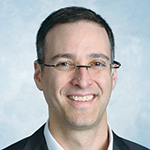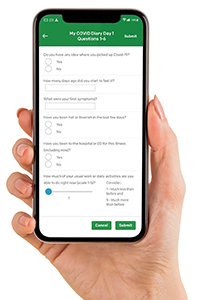By JULIE MINDA
In spring 2020, Dr. Ari Robicsek got a call from his sister in Toronto, who said she was having fevers that waxed and waned as well as anxiety attacks that were uncommon for her.
COVID-19 tests were in short supply early in the pandemic, and so the 40-something mom of four couldn't get tested. She asked Robicsek if he thought she was COVID-positive. He told her he didn't know whether she had the virus — there was no definitive list of symptoms at that time.

Robicsek
Robicsek, who is Providence St. Joseph Health chief medical analytics officer, recalls, "I was frustrated — both as an infectious disease specialist and as a big brother — that I couldn't help her."

My COVID Diary participants receive prompts on their smartphones to chronicle their experiences with the condition. Providence St. Joseph Health is using the entries to advance understanding of how patients experience the disease.
But the conversation got him thinking — what if the medical community didn't have to wait for the traditional, and lengthy, scientific research process to unfold, to better understand the virus? What if they could somehow ask numerous people who had tested positive for COVID what they were experiencing and then aggregate those responses to develop a COVID profile and symptom timeline?
That nugget of an idea has evolved into "My COVID Diary," a clinical research project that enlists COVID-positive patients in journaling about their symptoms and experiences so that Providence can mine those entries for discoveries about the disease. Providence is analyzing this trove of data in order to publish papers on the disease's progression and symptom permutations and develop approaches to support patients enduring socioeconomic setbacks related to COVID.

Vaezy
Sara Vaezy, Providence senior vice president and chief of digital and growth strategy, says, "There are a lot of things we're learning here that can apply when it comes to getting the voice of the patient more closely connected with our work. For example, we've learned from COVID that it's not just about the physical impact of a disease — there also are a lot of social, cultural and sociological impacts" to address.
In the dark
Bill Wright is Providence vice president of health innovation research and a member of the team that helped to build out the My COVID Diary project. He recalls that at the start of the pandemic, the medical community was scrambling to figure out what COVID was. "It quickly became clear that there was a lot that was not known. … Usually in medicine we have an idea what we're seeing, but there of course was no body of knowledge about COVID to inform our clinical response."

Wright
As one way to begin to address this information void, Robicsek brought his idea of gathering information from patients to his Medical Analytics Team as well as to Vaezy, Wright and colleagues in Providence's digital strategy unit in Renton, Washington. They brainstormed how to solicit such information from patients. They considered but rejected an idea to cull information from the social media feeds of people with COVID.
What they landed on was a participatory research approach in which Providence would invite its COVID-positive patients to become citizen scientists by providing narrative and other types of responses to questions delivered via their smartphones.
Traditional research projects usually involve investigators mapping out what they want to know, forming a hypothesis and developing and validating a process to answer the questions being posed. The Providence team wanted something vastly different for this initiative. Wright, who holds a doctorate in sociology, says, "We wanted to hear their input in narrative form, take that data and learn from it. It's a totally different type of data collection."
Citizen scientists
Since the initiative launched in August 2020, Providence has been contacting people aged 18 and over who are COVID-
positive, as determined by a test administered at a Providence facility. The introductory text invites patients to contribute to research by sharing their experiences when prompted on their smartphone. People who wish to participate complete a consent form on their smartphone.
Participants initially hear from Providence via text about every other day for the first two weeks, then once a week for the following three months, and then about once a month thereafter. The texts will come for one year.
The team wrote questions, or survey prompts, in conversational English. The questions in the prompts vary based on the patient's time from diagnosis and severity of symptoms.
Participants may be asked to journal about what they are experiencing including their physical symptoms, or lack of symptoms, and socioeconomic circumstances related to COVID. They may be encouraged to do a head-to-toe check-in. Most of the questions ask for free-form responses with no restrictions on length.
Providence says it is securing the data in a way that protects patients' privacy and anonymity. Patients are not paid for their participation.
Mining insights
Providence is analyzing responses using a technology called natural language processing, which looks for trends and patterns in information.
Robicsek and his team are using the responses in part to develop a symptom timeline. Providence has made initial study findings from the team's first paper available to study participants on a private website and is inviting their input. Once the research team incorporates their feedback, it will finalize and publish the study. The researchers hope that Providence clinicians will be able to apply the information to their work with patients who have COVID.
The project team is working with Providence's Center for Outcomes Research and Education in Oregon to analyze patients' input regarding their socioeconomic challenges related to COVID. That center's findings will help Providence determine what types of policies to push for in advocacy efforts and the like.
Participatory research
As of mid-July, Providence has invited more than 51,000 patients to participate in its survey research on COVID. More than 23,000 people have clicked on that message to learn more. Of those, 6,672 had signed on. Those respondents have completed more than 59,000 journal entries.
"We have been blown away by this response," says Robicsek. "It's an embarrassment of riches."
"We are seeing that when you reach people on their terms and understand what's important to them, that is the key to engagement," says Vaezy.
"We are learning things we never would have, had we not done this project," says Wright. "It's a new way of doing science."
Nonlinear progression
Some of the insights the project has turned up include that COVID symptoms can act in a way that is much different than symptoms for most other communicable diseases, says Robicsek. COVID has a very wide variety of symptoms — including fatigue, cough, headaches, sinus issues, anxiety and depression — but symptom onset can happen well after diagnosis. Also, COVID symptoms can come and go over time — just when sufferers think they are recovered, symptoms may return.
Wright notes that the odd trajectory of the disease has rolling ramifications for patients. For instance, their disease progression likely will be different from what human resources departments at job sites are prepared for — workers may need to go on and off sick leave.
Robicsek expects this research project will turn up countless insights — both from a medical and a socioeconomic perspective — that will have practical benefits for patients, their clinicians and others. "My COVID Diary has taught me how interested individuals with this disease are in taking ownership of the work of solving this disease. I am amazed and delighted with the response, and it makes me think: What else can we be doing with participatory research to help patients?"